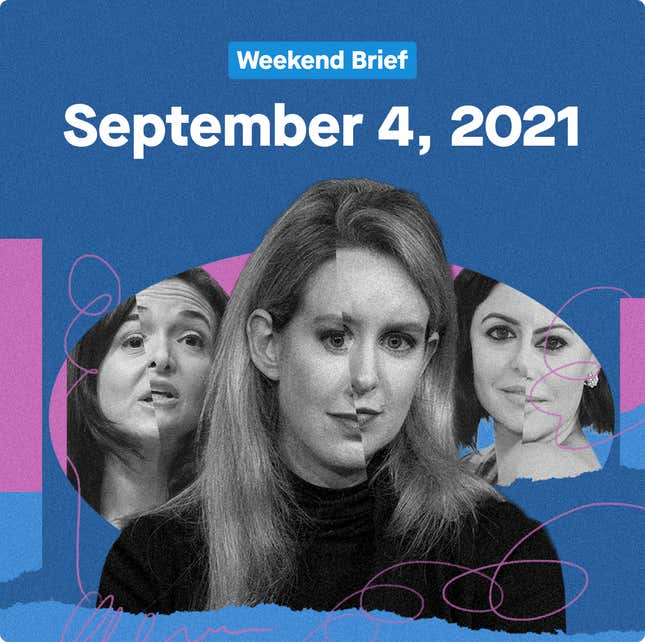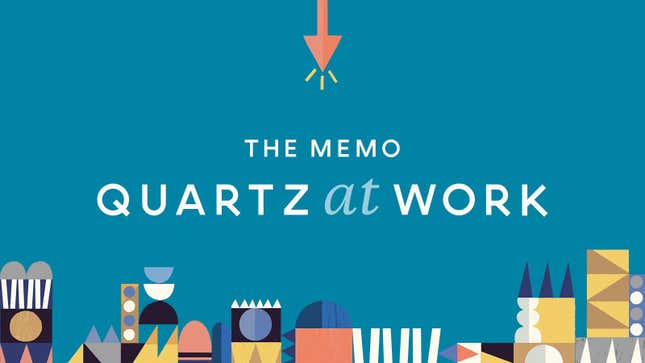
Good morning, Quartz members!
Male entrepreneurs don’t worry about walking into a room and getting compared to WeWork exile Adam Neumann, or Fyre Festival flameout Billy McFarland. But female entrepreneurs are still affected by the legacy of Elizabeth Holmes, the disgraced founder and ex-CEO of Theranos, whose fraud trial kicked off this week.
That’s partly because the comparative dearth of women leading splashy startups means that Holmes has always drawn outsize attention, both before and after her company was rocked by scandal in 2015. But it’s also because the Theranos chief’s downfall is intertwined with the backlash against the girlboss.
“Girlboss” was coined in 2014 by Sophia Amoruso, founder of fashion brand Nasty Gal, and soon described a new class of female CEO: young, ambitious, and embracing of Lean In-style corporate feminism (also, typically white and well-off). Holmes wasn’t exactly a girlboss, but she came to power when the figure loomed large in the cultural landscape. Girlboss success was meant to actively advance the cause of gender equity, though the specifics were always elusive.
The backlash began in the late 2010s, as Lean In took heat for failing to sufficiently grapple with systemic issues, and press exposés revealed that startup leaders like Away’s Steph Korey and Thinx’s Miki Agrawal created toxic environments. The gulf between these high-profile girlbosses’ goals and their behavior made the figure synonymous with privilege and empty promises. And while that reaction has its own problematic elements, it’s part of a larger rejection of hustle culture, and leaders who focus on their own success at the expense of their employees.
In 2021, girlboss tactics are even less likely to fly, coming from any gender. As the pandemic drags on, workers are suffering from collective burnout, and starting to effect what could be lasting change in the power dynamic between employers and employees. The new era isn’t about celebrating a boss of any kind; it’s about valuing leadership that puts other people first. —Sarah Todd
The backstory
- We once loved girlbosses. As author Leigh Stein puts it, girlbossing was “a game plan for success in the corporate workplace through the lens of self-improvement.”
- Now we love to dethrone them. Future historians may pinpoint the end of the girlboss era as Summer 2020, when toxic workplace allegations felled the heads of feminist companies like The Wing, Man Repeller, and Refinery29.
- The backlash is nuanced. It’s part of a necessary reckoning with the deficiencies of non-intersectional feminism, but society’s voracious appetite for stories of high-powered women brought low means those who exemplify the type are subject to outsize scrutiny.
Lean In
interlude

Sheryl Sandberg’s 2013 book served as a girlboss manifesto, but its reputation has evolved over the years, as has Sandberg’s. Even Michelle Obama took aim at Lean In’s emphasis on individual self-empowerment. “I tell women, that whole, ‘You can have it all’—mmm, nope, not at the same time, that’s a lie,” Obama said in 2018. “It’s not always enough to lean in, because that shit doesn’t work all the time.”
In a profile of Sandberg earlier this year, Quartz reporter Sarah Todd explored what the career arc of Facebook’s COO reveals about our culture’s complicated relationship with powerful women in business.
What to watch for next
- New playbooks for managers. For more inclusive approaches, look to companies that have devoted themselves to feminist and anti-racist practices.
- Momentum with white-collar unions. Some US knowledge workers are turning to organizing to make their workplaces more employee-friendly.
- A more global conversation. In China, employees are rebelling against “996” culture, while India’s remote workers are pushing for better work-life balance.
- Gen Z reshaping expectations. Today’s young people want to work for companies that prioritize diversity, inclusion, ethics, and employee well-being.
- Fresh and creative policies. Ideas like complete salary transparency and the four-day workweek can be controversial, but also potentially revolutionary.
Do you get The Memo?

If you want more intel on building a productive, creative, and compassionate work culture—with zero fraudulent blood-testing machines—sign up for The Memo, a weekly newsletter for modern workers, brought to you by Quartz at Work.
7 Quartz stories to spark conversation
🚨 Texas’s anti-abortion law turns citizens into bounty hunters
🌀 New Orleans’ infrastructure did… OK against Hurricane Ida
🥽 Facebook Workrooms brings the worst of office life to VR
🇨🇳 Chinese citizens aren’t sold on a partnership with the Taliban
🍟 Do fast-food chains still need dining rooms?
🏀 It’s busy season for Matthew Berry, ESPN’s fantasy sports guru
🎲 Esther Perel says all work with no play makes everyone dull
5 great stories from elsewhere
💲 Everyone is raising prices—except Dollar Tree. Supply Chain Dive looked at how shipping logjams are particularly tough if a $1 price point is kind of your whole thing.
✨ The Diapers.com guy wants to build a utopian megalopolis. Bloomberg Businessweek spent six months learning Marc Lore’s plan to solve the US wealth gap.
🛒 CVS has a retail gang problem. The Wall Street Journal shadowed the chain’s top investigator as he combats groups that steal in bulk and resell goods on Amazon.
🛡️ Is a game a game without game play? Platformer goes deep on Loot, a viral NFT social network (you read that right), and how it might evolve over time.
🍹 What we talk about when we talk about wastin’ away. Eater examined the Times Square Margaritaville (“if Ready Player One was only Jimmy Buffett references”), and the context behind its namesake song.
Thanks for reading! And don’t hesitate to reach out with comments, questions, or topics you want to know more about.
Best wishes for an inclusive weekend,
Sarah Todd, senior reporter (boss goals: Leslie Knope)
Kira Bindrim, executive editor (boss goals: Liz Lemon)
